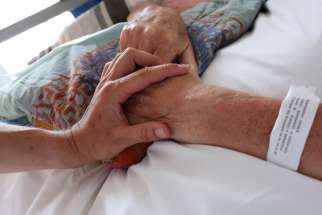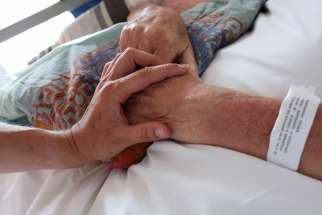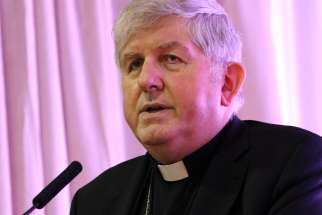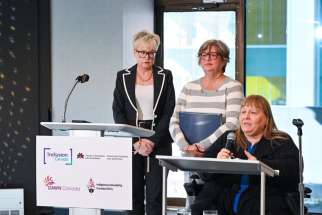Pro-lifers criticize ‘rigged’ MAiD consultations
B.C. pro-life leaders are crying foul over what they charge is a rigged Health Canada consultation on medical assistance in dying (MAiD), saying it’s aimed at suppressing opposition to the legalization of advance requests as Quebec is doing.
Concerns that vulnerable pushed toward MAiD
A new survey co-commissioned by the Angus Reid Institute and Cardus found 62 per cent of Canadians are concerned that socially and financially vulnerable citizens will choose euthanasia instead of seeking out adequate and quality health care.
MAiD non-compliance goes unpunished
Regulators of Ontario’s euthanasia program have identified 428 cases of non-compliance by assisted suicide providers since 2016, but none of those violations were reported to the public or law enforcement.
Quebec defies Canadian law on MAiD directives
Quebec began accepting advanced requests for assisted suicide on Oct. 30, and the federal government has pledged not to stand in the Francophone province’s way.
Achtman brings out humanity in end-of-life stories
On Oct. 30, the Province of Quebec implemented its highly controversial euthanasia directives that allow certain patients to make advance requests for medical assistance in dying (MAiD), beating any national changes to the current law. Now, patients can request MAiD well before the natural end of life under the guise that the appeal is required before their condition renders them incapable of giving consent.
Bishops champion life over MAiD
The Canadian Conference of Catholic Bishops (CCCB), the Pontifical Academy for Life (PAV) and collaborating stakeholders have crystalized a vision of palliative care that champions life rather than medically assisted death.
Euthanasia empties life of its meaning
In 2013, I wrote a column for the National Post about Dr. Donald Low, a microbiologist at Mt. Sinai Hospital. He spoke about his cancer diagnosis, his fear of tremendous pain that might be looming and the loss of his dignity. He spoke without self-pity and urged Canada to make physician-assisted death legal. He died eight days later.
Call it what it is: lethal injection
“Saddened, but not surprised” is how Cardinal Thomas Collins characterized his reaction to Canada’s now infamous reputation as the world’s fastest-growing euthanasia regime.
Disability rights coalition challenging Track 2 MAiD
A coalition of disability rights organizations has united to challenge Track 2 of Canada’s Medical Assistance in Dying (MAiD) law, which provides euthanasia to people with a disability who are not dying or whose death is not reasonably foreseeable.
MAiD exception to the rules
Hope already seemed on life support in what have become the killing fields of Canada’s public health-care system.
Doctors rise up to fight Nova Scotia MAiD law
The Christian Medical and Dental Association (CMDA) of Canada, along with more than 40 Nova Scotia medical practitioners and 10 Dalhousie medical school graduates, have urged the College of Physicians and Surgeons of Nova Scotia (CPSNS) to renege on a new policy they believe violates their conscience rights.
Prison MAiD safe: Correctional Service of Canada
Despite concerns surrounding the implementation of Medical Assistance in Dying (MAiD) for Canadian federal prisoners, the Correctional Service of Canada (CSC) is confident the process is fool proof.
Editorial: ‘Is MAiD made for prisoners?’
The appalling contemporary throwback known by its cutesy euphemism “medical aid in dying” (MAiD) is now making its death fingered presence felt in the nation’s jail houses.
Vancouver Catholic hospital faces MAiD ‘conundrum’
More than half a year has now passed since the British Columbia government ordered Vancouver Coastal Health to build a euthanasia facility next to St. Paul’s Hospital, thereby doing an end run around the Catholic hospital’s principled opposition to assisted suicide.
The parents of a terminally ill woman who was transferred to another facility to be euthanized after St. Paul’s Hospital refused to allow the procedure on its premises are suing the provincial government and Providence Health Care, the Catholic health-care provider that operates St. Paul’s.
















